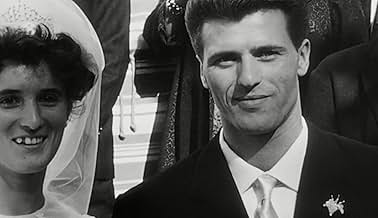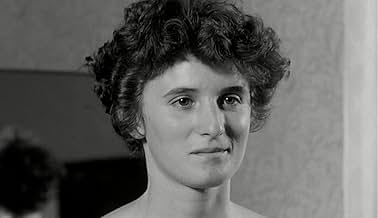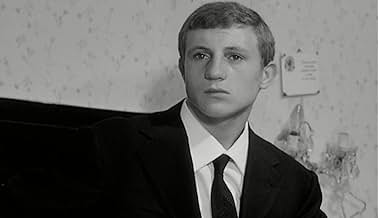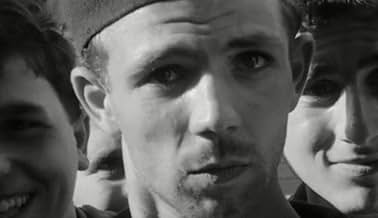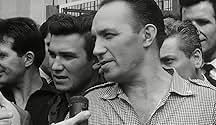IMDb RATING
7.5/10
2.9K
YOUR RATING
Director Pasolini traverses Italy in 1963 with camera and microphone interviewing people in public places about sex, marriage and gender roles.Director Pasolini traverses Italy in 1963 with camera and microphone interviewing people in public places about sex, marriage and gender roles.Director Pasolini traverses Italy in 1963 with camera and microphone interviewing people in public places about sex, marriage and gender roles.
Lello Bersani
- Self - Narrator
- (voice)
Graziella Chiarcossi
- Self - Graziella the Bride
- (uncredited)
Pier Paolo Pasolini
- Self - Interviewer
- (uncredited)
7.52.9K
1
2
3
4
5
6
7
8
9
10
Featured reviews
slices of life
At first sigh, social portrait. Pier Paolo Pasolini across Italy , talking with large categories of people about not very comfortable themes. Their answers, the crowd, the familiar names from Antonella Lualdi and Oriana Falacci to Alberto Moravia, Cesare Musatti or Giuseppe Ungaretti interventions and the answers, genuine, innocent, in few cases hypocritics of people and the discover of powerful tradition defining rules of life, the difference, real profound, betwen South and North of Italy, the silence of middle class , the laws and the essence of a special world. Sure, in my case, the name of director/ interwiever was the basic/ fundamental kick for not ignore this documentary. The prize - the high honesty, the humor, smiles, reactions, laugh, shame, reactions, the manner to explore the one front of him by Pasolini, the crumbs of nostalgia, the memories about pasolinian textes. So, a large slice of life, provocative, in same measure, yesterday and today and, in my case, just fascinating.
Interesting document of time and place
Saw this beautifully preserved/restored print, with subtitles, via YouTube. Pasolini, with his reputation for political and every other form of radicalism, seems inhibited here, even in the discussion segments with Alberto Moravia and Cesare Musatti. The man-and-woman (and children, students)-in-the-street-and-on-the-farm interviews seem dated, probably since the interviews were conducted on the cusp of major changes in marital and family laws, policies, sexual attitudes in Italy and elsewhere. While no groundbreaking documentary, it's still a fascinating document of the time and place. A more daring and cinematically imaginative treatment of similar themes is found in, of course, "I am Curious (Yellow)"(1967) and "I am Curious(Blue)"(1968), directed by Vilgot Sjoman (a former UCLA film student). In those days there were things you could do in Sweden, albeit with censorship problems, that were simply impossible in Italy, period.
An interesting window into the period
Pasolini's informal interviews with Italians about sexual matters doesn't make for a perfect study or a perfect documentary, but it does provide an interesting window into the time period, and it was pretty unique as well. The people he talks to seem to provide a pretty good sample, including those from many regions in Italy and across various categories - men/women, old/young, city/rural, college educated/blue collar, and conservative/liberal. As most of his interviews are conducted in big groups and what appear to be impromptu meetings I don't think it was all that scientific, and wondered how many things were left unsaid out of social pressure. However, in the end I felt like people hadn't been shy with expressing their opinions, and a picture was painted of a changing country - the deeply conservative aspects gradually facing inevitable progress.
The questions that Pasolini seemed most concerned with were:
Is sex important? Are young girls as free as young boys? Should a woman be a virgin when she gets married? Does marriage solve the "sexual issue"? What do you think of sexual "abnormality"? (by this he means, argh, homosexuality) Should divorce be legalized in Italy? (it wasn't possible in the country until 1970)
It's a little tough to hear some of the answers, e.g. about how women are inferior and shouldn't be allowed to work or even go out to a café alone, how a woman should be killed if she commits adultery instead of divorced (to lots of jokes and smiles!), or how homosexuals are disgusting and should be "cured." It was also a little tough to hear Pasolini push so much for prostitution, asking young women workers why they don't make a lot more money by selling themselves, not thinking to interview a prostitute about the significant dangers of her profession or the emotions involved with selling one's body. Similarly, he doesn't interview someone who is gay, even with their identity concealed. His questions often reflect the patriarchy and conformity, making it a window into Pasolini in addition to the window into Italy, and I say that knowing his orientation.
I don't fault the film too much for these things because it's reflecting the society in 1964, and I'm happy times have changed. If a documentary was made about values today, I'm certain that when viewed over half a century later we, too, would collectively appear backward (hell, we appear pretty backward even today :). It was also a pleasure to hear answers which were real gems, a lot of times from young women, professing a desire for equality between the sexes, an end to the outmoded double standard, and practicality in allowing divorce. In a couple of places a clear link is formed between poverty and some of the archaic attitudes, which I found fantastic. That included one guy explaining that sexual harassment at work is a problem thusly:
Man on street: "Freedom is conquered through work. In Germany, they work from when they're 12 to old age. ... In Palermo, if a woman goes to work, her brother grabs her and says, 'Where are you off to?' 'To work.' 'You can't go. The boss will harass you.' Do you understand?" Pasolini: "And so you agree that if economic conditions changed in Palermo..." Man on street: "When employers learn how to behave with girls! Only then! When employers are polite towards women."
Pasolini then idiotically says "but the boss can't have sex with one hundred workers," which even if he's playing devil's advocate is a flawed argument in several respects and which leads to a response that goes down the rathole, that yes indeed, here in Sicily one or two women a day could be easily done. These are the kinds of things you put up with in Love Meetings.
The questions that Pasolini seemed most concerned with were:
Is sex important? Are young girls as free as young boys? Should a woman be a virgin when she gets married? Does marriage solve the "sexual issue"? What do you think of sexual "abnormality"? (by this he means, argh, homosexuality) Should divorce be legalized in Italy? (it wasn't possible in the country until 1970)
It's a little tough to hear some of the answers, e.g. about how women are inferior and shouldn't be allowed to work or even go out to a café alone, how a woman should be killed if she commits adultery instead of divorced (to lots of jokes and smiles!), or how homosexuals are disgusting and should be "cured." It was also a little tough to hear Pasolini push so much for prostitution, asking young women workers why they don't make a lot more money by selling themselves, not thinking to interview a prostitute about the significant dangers of her profession or the emotions involved with selling one's body. Similarly, he doesn't interview someone who is gay, even with their identity concealed. His questions often reflect the patriarchy and conformity, making it a window into Pasolini in addition to the window into Italy, and I say that knowing his orientation.
I don't fault the film too much for these things because it's reflecting the society in 1964, and I'm happy times have changed. If a documentary was made about values today, I'm certain that when viewed over half a century later we, too, would collectively appear backward (hell, we appear pretty backward even today :). It was also a pleasure to hear answers which were real gems, a lot of times from young women, professing a desire for equality between the sexes, an end to the outmoded double standard, and practicality in allowing divorce. In a couple of places a clear link is formed between poverty and some of the archaic attitudes, which I found fantastic. That included one guy explaining that sexual harassment at work is a problem thusly:
Man on street: "Freedom is conquered through work. In Germany, they work from when they're 12 to old age. ... In Palermo, if a woman goes to work, her brother grabs her and says, 'Where are you off to?' 'To work.' 'You can't go. The boss will harass you.' Do you understand?" Pasolini: "And so you agree that if economic conditions changed in Palermo..." Man on street: "When employers learn how to behave with girls! Only then! When employers are polite towards women."
Pasolini then idiotically says "but the boss can't have sex with one hundred workers," which even if he's playing devil's advocate is a flawed argument in several respects and which leads to a response that goes down the rathole, that yes indeed, here in Sicily one or two women a day could be easily done. These are the kinds of things you put up with in Love Meetings.
"Would Pasolini be a youtuber today?"
Pasolini had some topics of interest, and in this documentary he enquires the italian populace about some of them!
The movie follow some kind of structure, but the overall concept is Pasolini interviewing groups of people in several different places. I find some of the question he does a little vague but for at the time being were quite outrageous!
There's the general depiction of how people thought about in the 60's Italy and although both Pasolini and the crowd had some outdated use of language for today standards, there are several interesting points of view for further analysis. Even Pasolini had to regulate some of the answers here with an amusing "autocensura"!
I'm not very fond of documentaries, it drags on a bit after a while , but I found myself engaged at moments.
The movie follow some kind of structure, but the overall concept is Pasolini interviewing groups of people in several different places. I find some of the question he does a little vague but for at the time being were quite outrageous!
There's the general depiction of how people thought about in the 60's Italy and although both Pasolini and the crowd had some outdated use of language for today standards, there are several interesting points of view for further analysis. Even Pasolini had to regulate some of the answers here with an amusing "autocensura"!
I'm not very fond of documentaries, it drags on a bit after a while , but I found myself engaged at moments.
Good Interviews
Comizi d'amore (1965)
*** (out of 4)
Pasolini travels around Italy throwing a mic into various ranges of people asking frank and honest questions about sexuality. Various topics ranging from homosexuality, prostitutes, divorce, sexual freedom and even asking kids where babies come from. The type of people range from college students to the rich and poor and to women who normally can't speak openly. I'm sure this film was more of a sensation when originally released but I think it holds up quite well today for several reasons. For one, it's interesting to look back over forty-years ago and see how young people at the times thought about sex but also how the older people back then looked back on the moral and religious rules of their youth. The film also holds up well today because things really haven't changed too much whenever you really break down the groups of people like Pasolini did. I'm not sure is there was a point to this documentary as it seems like the director simply wanted to know what the country felt on certain issues. There's a lot of humor to be found in the film but most of this comes from the answers the children give about where babies come from. The most interesting thing, knowing that the director was gay, is him asking people about homosexuality and the answers they give him. Most people reply with disgust and I kept wondering if the director would crack and say something but he never does. I think the film goes on a bit too long but it's an interesting look at sexuality on moral and religious aspects.
*** (out of 4)
Pasolini travels around Italy throwing a mic into various ranges of people asking frank and honest questions about sexuality. Various topics ranging from homosexuality, prostitutes, divorce, sexual freedom and even asking kids where babies come from. The type of people range from college students to the rich and poor and to women who normally can't speak openly. I'm sure this film was more of a sensation when originally released but I think it holds up quite well today for several reasons. For one, it's interesting to look back over forty-years ago and see how young people at the times thought about sex but also how the older people back then looked back on the moral and religious rules of their youth. The film also holds up well today because things really haven't changed too much whenever you really break down the groups of people like Pasolini did. I'm not sure is there was a point to this documentary as it seems like the director simply wanted to know what the country felt on certain issues. There's a lot of humor to be found in the film but most of this comes from the answers the children give about where babies come from. The most interesting thing, knowing that the director was gay, is him asking people about homosexuality and the answers they give him. Most people reply with disgust and I kept wondering if the director would crack and say something but he never does. I think the film goes on a bit too long but it's an interesting look at sexuality on moral and religious aspects.
Did you know
- ConnectionsEdited into Lo schermo a tre punte (1995)
- How long is Love Meetings?Powered by Alexa
Details
Box office
- Gross worldwide
- $2,789
- Runtime
- 1h 32m(92 min)
- Color
- Sound mix
- Aspect ratio
- 1.85 : 1
Contribute to this page
Suggest an edit or add missing content


